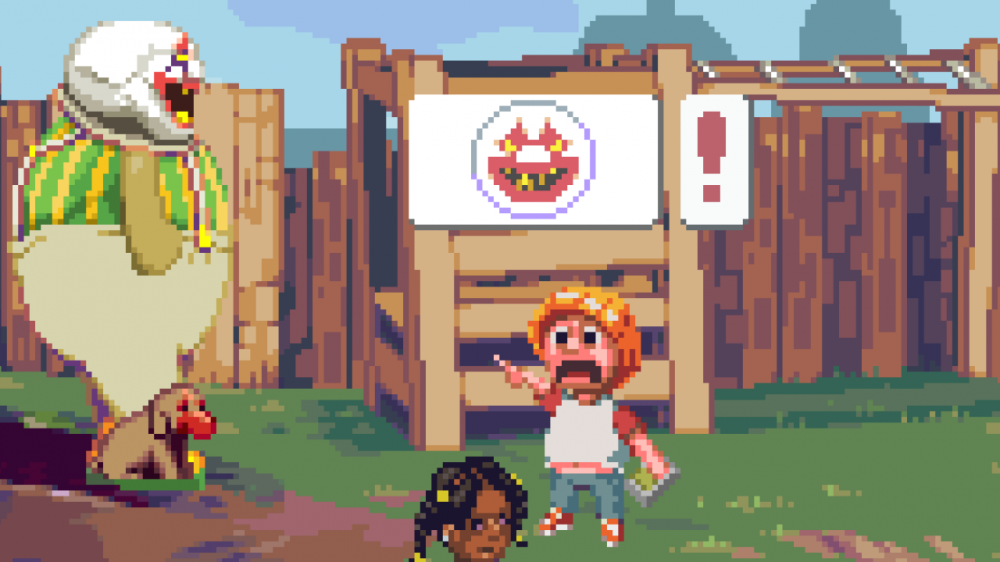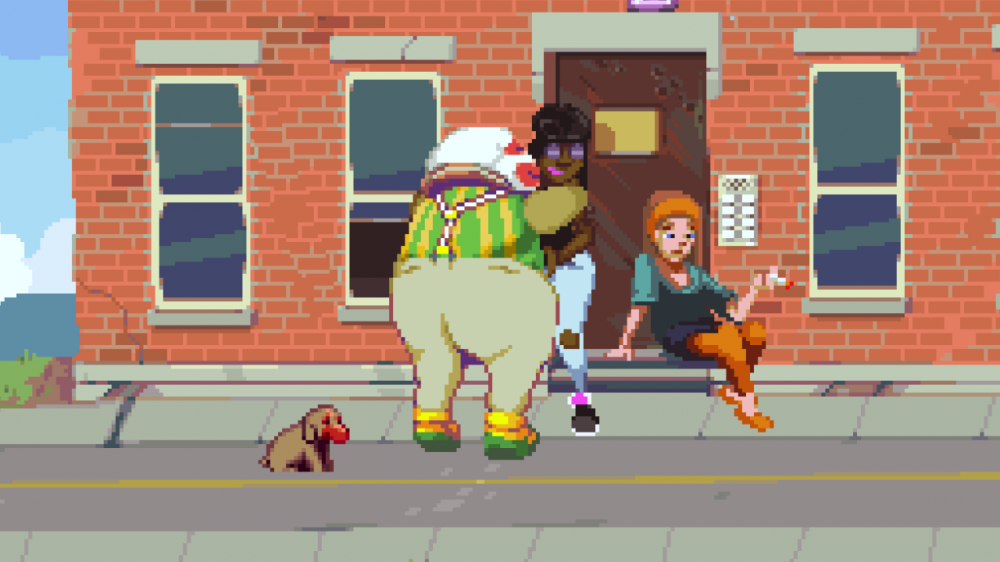Dropsy Review – Can't Sleep, Clown Will Eat Me
An old school point-and-clicker that hides its significant charm behind a scary clown face.

Let’s get this out of the way; Dropsy freaks the hell out of me. For the life of me, I couldn’t shake the feeling that I was being slowly tortured by a retro-inspired nightmare. The colour palate alone evokes the same effect as someone dragging their fingernails down a chalkboard. Indeed, the game made me realise I probably have a touch of coulrophobia. But putting my insecurities aside, Dropsy is one very good game that adventure fans should play. Just don’t send me your psychologist bill.
What is it about clowns that evoke such a sense of unease? Psychologist Sigmund Freud might say that clowns embody the notion of the “uncanny,” that feeling of when you look at something or someone and it’s not quite right. The thing in question is often recognisable, but just different enough to be disconcerting. By all accounts, this is the pretext underlying Dropsy - a slightly rotund clown with a garish yellow-toothed smile, ghostly pale make-up, and an eclectic outfit that wouldn’t be out of place in the 1980s. Based on appearances only, this is not the sort of clown you’d invite to perform at children’s parties. Or associate with. Ever.
The people that Dropsy comes in contact with are more than happy to oblige this stereotype. Time and time again Dropsy runs into complete strangers who, understandably so, recoil in disgust purely because of his looks. A little girl runs screaming away in horror. A shop proprietor is more than ready to get abusive. The irony was not lost on my when a man in a chicken suit – himself looking absolutely ridiculous – also rejects Dropsy purely based on appearances.
But clown paint is only skin deep.
Behind the greasy clown make-up is a simple, relatable and innocent soul with a singular purpose – to bring a measure of joy to the world. Much like reality I suppose, the world of Dropsy is inhabited by sad people simply etching out an existence. And so, even in spite of all of his grotesque absurdities, Dropsy just wants to cheer them up. That is, after all, what clowns are supposed to do (well unless you happen to be Stephen King’s IT).
For a similar game, also read: Blackwell 4: Deception Review
For a similar game, also read: Blues and Bullets: Episode One Review
So for the most part, the purpose of Dropsy is wrapped up in puzzles designed to ease the discomfort and sadness of the people he comes into contact with, even in the face of superficial prejudice. The little girl that fled from Dropsy? Dropsy later returns with a flower for her. After stumbling upon a homeless lady living in an alley, Dropsy sources some food for her. The end result of helping out someone in need is rather fitting: Dropsy always gives them a big hug.
At the end of the day, the idea of Dropsy can be distilled down into the notion, “don’t judge a book by its cover.” The moral was a little too obvious and cliché for my liking, but it doesn’t lessen the genuine charm of Dropsy. It’s hard not to feel a little sad for Dropsy with such pure motives, yet copping a constant torrent of abuse. Makes you think, right?

For better or worse – depending on which school of thought you subscribe to – Dropsy dutifully trots down the well-worn path of classic point-and-click adventure game tropes. Think The Curse of Monkey Island. For adventure purists, this is great news. But for those unfamiliar with how things were done “back in the day,” you may wonder what all the fuss is about. Dropsy tends to rely a little too much on random chance, with the logic behind puzzles at times being quite fuzzy, leading to sporadic spikes in difficulty.
As an example, Dropsy doesn’t communicate through traditional dialogue. Instead, conversations are played out through pictures that can be quite obscure and difficult to understand. At other points during the game I found myself wandering around aimlessly, with the number of puzzles, conversations and clues piling up very quickly. I wasn’t sure which puzzle I was supposed to tackle next, or where I was supposed to use a particular inventory item. Or, indeed, where I was supposed to collect an inventory item that had to be used in a very specific way. Like I said, classic point-and-click tropes.
One way in which the classic adventure formula is shaken up is the introduction of a day/night cycle. At first I didn’t really see the point apart from a nice aesthetic touch. But wandering through the same area at different times of the day yielded new rewards. Certain NPCs and quests only become available at particular times, for example. This was a nice way to shake up the game and introduce different takes on the same scene. Though it should be noted this also increases the complexity of the game - figuring out what time of the day I needed to be at a certain scene to interact with someone became a tad overwhelming.
Speaking of which, for such a relatively small and contained game, the variety of puzzles and environments is fantastic. Throughout my time in the oversized shoes of Dropsy, I raided a secure medical facility, danced my clown butt off at a nightclub and explored some caves. I was always entertained with the direction Dropsy took me and appreciated the wide variety of things to do and places to see.
Truly, Dropsy is not a game for everyone - a game that adheres to the classic tropes of adventure games of yesteryear may not be to your liking. Likewise, if clowns make you uncomfortable then you might want to start running for the hills now. But for everyone else, Dropsy is a quiet and unassuming title that makes you think. If you can look past the grotesque exterior of a freaky clown, you'll find a simple soul with much love to give.
You can grab Dropsy here.

Writer:
Stephen Mitchell


